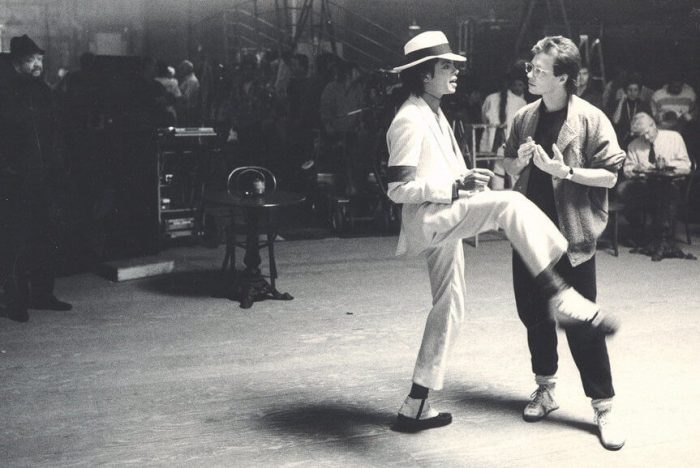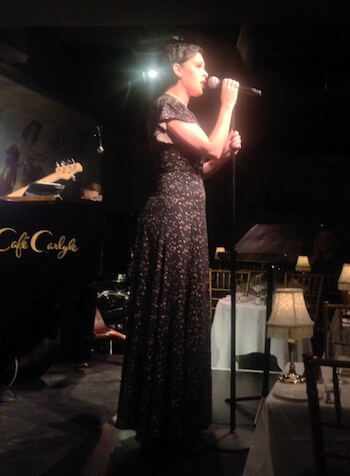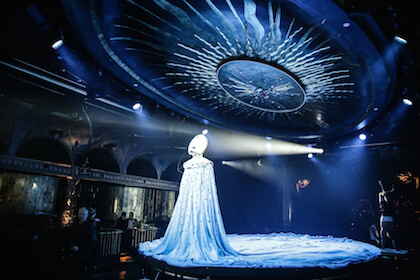Al Pacino and Bobby Cannavale in the revival of Glengarry Glen Ross” at the Schoenfeld Theatre. | SCOTT LANDIS
BY CHRISTOPHER BYRNE | In his Pulitzer Prize-winning play “Glengarry Glen Ross,” David Mamet uses language and situation to mine the more elemental characteristics of males — survival, sexual prowess, and dominance — all in the metaphor of competition to sell questionable tracts of land in early ‘80s Florida. It is a battle royale in a kill-or-be-killed culture where leads for potential buyers are the prize, closing a sale leads to animalistic chest-beating, and ethics have no place.
Under Daniel Sullivan’s direction, the new production at the Schoenfeld is solidly entertaining and replete with the eerie echoes of everything from Ponzi schemes to the subprime mortgage crisis. If the Florida land scheme now seems quaint and the shoddy and the slick salesmen Mamet has created come off like lambs compared with Bernie Madoff, the greed and fear that drive them are nearly as old as humanity.
At the center of the production — and the marketing — is Al Pacino who plays Shelley “The Machine” Levene, a veteran salesman desperate to hold onto his job and his manhood. He is desperate for the “good leads,” but John Williamson, the office manager, doles them out to younger, more aggressive and successful men. Now routinely passed over, Levene makes the predictable arguments about his long experience, but this is a merit-based system and he is the infirm animal being culled from the herd. In the second act, having made an impossible sale, Levene is apparently back on top, strutting and preening, the ruler recovered to glory — at least for a time.
Pacino is strong in the role, downplaying Levene’s desperation and focusing instead on the character’s wiliness, desperate not so much to maintain his income but to prove in the company of men that he still “has it.” That is the currency that matters to him, and it’s a different take on the role than has been seen in the past. Pacino is the consummate actor, but at times his theatricality overwhelms the scene and he would be more convincing if his performance were simpler.
Bobby Cannavale as Richard Roma is the younger man who has supplanted Levene in the operation and sets the quasi-Oedipal themes in motion. Cannavale is magnificent, using all the tricks in the book to express his dominance while clearly using the all-too-compliant Levene for his own ends. The interplay between the two men consumes the second act, and it’s fascinating.
The rest of the company is strong, particularly David Harbour as the conflicted Williamson who has had unearned power conferred on him, and Jeremy Shamos as James Lingk, one of Roma’s marks, is quite compelling as a man not equal to competing in this bloodsport.
This is a more subtle production than others I’ve seen, but with fewer pyrotechnics — some of Pacino’s choices aside — it becomes both more interesting and more harrowing, and that is a powerful combination.
“The Mystery of Edwin Drood” is a sprawling mess of a musical. With book, music, and lyrics by Rupert Holmes, it purports to dramatize Charles Dickens’ last, unfinished novel as portrayed by a provincial Victorian theater troupe. Dickens’ plot very nearly takes a backseat to the dramatic egos and antics of the troupe and is structured largely to give each of the actors a chance to do his or her specialty. Anyone familiar with Dickens will recognize the character types and form of the show, reflecting his humorous affection for the provincial theater, which shows up several times in his works.
Chita Rivera, Stephanie J. Block, and Will Chase in the Roundabout production of “The Mystery of Edwin Drood.” | JOAN MARCUS
The music, for the most part is undistinguished, so to succeed a production has to rely on its charm and good humor. Happily, the current Roundabout revival has plenty of that going on and the show is best enjoyed as a rollicking good time. Director Scott Ellis has mounted the show with an emphasis on the fun, and he’s assembled a cast that does him proud. Stephanie J. Block in the title role is outstanding, as are Jim Norton as the Chairman who manages the company and Will Chase as John Jasper. They all have the mix of seriousness and irony this show demands.
In supporting roles, it’s a delight to see Chita Rivera as Princess Puffer, and Andy Karl is a caricature of villainy as Neville Landless. Peter Benson as Bazzard, a lesser character with one of the three good songs — “Never the Luck” — is hilarious. The other two memorable songs are the oft-reprised “Moonfall,” performed beautifully by Betsy Wolfe as the standard-issue Dickens ingénue Rosa Bud, and “Perfect Strangers,” a duet between Block and Wolfe.
The gimmick of the show is that since Dickens’ novel was unfinished, the audience gets to vote on the outcome, and that process provides great fun in the latter half of the second act.
The sensational costumes and sets are by William Ivey Long and Anna Louizos, respectively, and they perfectly capture the period and the sense of fun that characterize this nearly perfect production of an imperfect show.
GLENGARRY GLEN ROSS | Schoenfeld Theatre | 236 W. 45th St. | Tue. at 7 p.m.; Wed.-Sat. at 8 p.m.; Sat at 2 p.m.; Sun. at 3 p.m. | $72-$152 | telecharge.com or 212-239-6200
THE MYSTERY OF EDWIN DROOD | Roundabout Theatre Company at Studio 54 | 254 West 54th St. | Tue.-Sat. at 8 p.m.; Wed., Sat.-Sun at 2 p.m. | $42-$147 | roundabouttheatre.org or 212-719-1300










